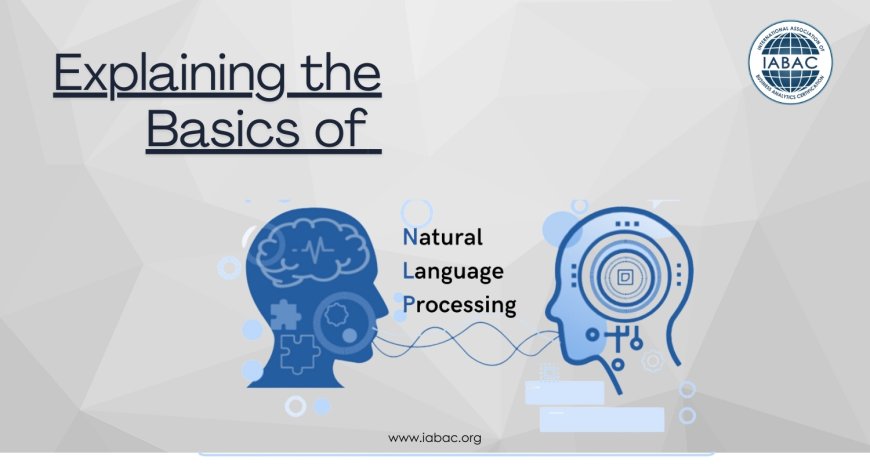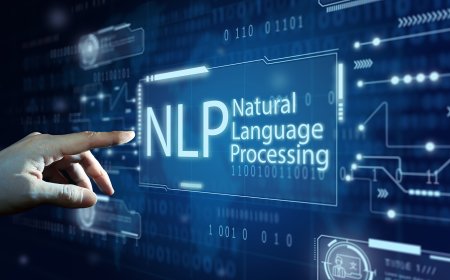Explaining the Basics of Natural Language Processing
Discover the fundamentals of Natural Language Processing (NLP) in a concise guide. Learn how NLP works and its applications.

Natural Language Processing (NLP) is all about teaching computers to understand and use human language better. It's like giving them the ability to talk and understand like we do. In our world today, where we're constantly typing and talking, NLP is important because it helps computers make sense of all that language. NLP is a mix of different stuff like language studies, computer smarts, and artificial intelligence. By borrowing ideas from how we learn, how computers work, and how we find information, NLP helps computers read, understand, and even write human language almost like humans do.
With NLP, computers can do all sorts of cool things, like analyzing texts, understanding what they mean, and finding specific information quickly. They can figure out if someone's happy or sad from what they write, translate languages, or even summarize long articles. This article is here to help you understand the basics of Natural Language Processing. We'll talk about why it's so important in the world of computers and how it's used in different areas. By digging into how NLP works, we can see how it's changing the way we interact with technology.
The Power of Natural Language Processing
Businesses are always looking for new ways to stay ahead. One big game-changer is using Natural Language Processing (NLP). NLP is a type of artificial intelligence that helps computers understand, interpret, and use human language in useful ways. It's used in lots of different ways, like customer service chatbots, understanding social media feelings, and translating languages. Using Natural Language Processing has become important for businesses in lots of industries.
One important thing NLP does is improve how businesses talk to their customers. With NLP chatbots, companies can give personalized and fast customer support all day, every day. These chatbots can understand and answer customer questions right away, making customers happier and reducing wait times. Also, NLP helps businesses look at lots of written information to find useful insights that help make decisions. For example, sentiment analysis helps companies understand what customers think and like, so they can make products and services that people want.
NLP is also changing how businesses talk to people who speak different languages. Fancy NLP programs can translate languages well, which helps businesses break down language barriers and grow globally. This lets businesses reach more people and find new opportunities. Using Natural Language Processing isn't just a trend – it's really important for businesses that want to stay ahead. With all the different things it can do, NLP will keep changing industries and making new ideas for years to come.
Understanding the Challenges of Using Natural Language Processing in Business
Many businesses are starting to use something called "natural language processing" (NLP) to make their operations smoother. NLP can help with things like making work faster, improving how things run, and making customers happier. But using NLP isn't always easy. Let's look at some of the problems that businesses might face when they try to use NLP.
1. Getting Good Data: Using NLP means needing lots of good information. However getting this information can be hard, especially for businesses just starting with NLP. And even when they have the data, they need to make sure it's accurate and complete.
2. Language is Tricky: People's language is complicated. There are lots of little details, slang words, and different meanings depending on the situation. NLP systems have to be good at understanding all of this, which can be tough.
3. No Set Rules: Unlike some other types of data, language doesn't follow strict rules. This makes it hard for NLP systems to understand everything the same way every time. Businesses often have to spend a lot of time customizing NLP to work for them.
4. Privacy and Ethics: Using NLP can raise concerns about privacy and ethics. Businesses need to be careful about how they use people's data and make sure they follow rules about privacy, like GDPR or CCPA.
5. Fitting into Existing Systems: Adding NLP to systems a business already uses can be complicated. Sometimes, old systems don't work well with new ones, or people don't want to change the way they do things. Making sure everything works together smoothly can be a challenge.
6. Keeping Things Up to Date: NLP systems need to be updated regularly to keep working well. Language changes over time, so NLP systems have to keep up with these changes. This can be hard for businesses to manage without causing problems.
7. Teaching People How to Use It: For NLP to work, people need to know how to use it. Businesses have to train their employees to use NLP tools effectively so they can get the most out of them.
While using Natural Language Processing in business can have big benefits, businesses need to be ready to deal with these challenges. They need to make sure their data is good, their systems work together, and their employees know how to use NLP well.
How can businesses use Natural Language Processing to help them?
Natural Language Processing (NLP) is helpful for businesses nowadays. It helps them understand lots of information that isn't organized, like what customers think, what's popular on social media, and what's happening in the market. With NLP, businesses can figure out how customers feel and what they like by analyzing their comments and messages. This helps them make smart choices about how to make their products better, keep customers happy, and make more money. Also, NLP can do some jobs automatically, like answering customer questions, writing content, and putting data into a computer. This saves time and money. Plus, NLP makes it easier for teams to share information and work together better. So, when businesses use Natural Language Processing, they get ahead by using language data to come up with new ideas, work faster, and make customers happy.
Understanding the Basics of Natural Language Processing
Natural Language Processing (NLP) is all about teaching computers to understand and use human language. It helps them chat with us, translate languages, and do many other cool things. Let's break down the basics of NLP and how it works.
1. What is Natural Language Processing?
-
NLP is about making computers understand human language. It helps them read text, recognize speech, and understand what we mean.
2. Key Components of NLP:
-
Breaking Down Text: Turning text into smaller parts like words or sentences.
-
Removing Unimportant Words: Getting rid of common words like "the" or "and" that don't tell us much.
-
Reducing Words: Making words simpler by finding their root form.
-
Spotting Important Things: Recognizing names, dates, and places in the text.
-
Labeling Words: Figuring out what role each word plays in a sentence.
3. How NLP Works:
-
Getting Text Ready: Cleaning up text and making it easy to understand.
-
Finding Important Stuff: Picking out important words or phrases from the text.
-
Training Models: Teaching computers to do tasks like understanding feelings in text or translating languages.
-
Testing and Improving: Making sure the computer is doing a good job and fixing any mistakes.
4. Applications of NLP:
-
Feeling Detector: Figuring out if text sounds happy, sad, or neutral.
-
Language Translator: Changing text from one language to another.
-
Chatbots and Helpers: Talking to us in a natural way to give us information or help us.
-
Short Summaries: Making short summaries of long pieces of text.
-
Finding Info: Pulling out important details from messy text.
5. Challenges in NLP:
-
Tricky Words: Words can have more than one meaning, making it hard for computers to understand.
-
Understanding Context: Knowing what's happening around the words is important for computers to get it right.
-
Good Data Needed: Computers need good-quality data to learn from; bad or biased data can cause mistakes.
-
Learning New Stuff: Computers might not be great at new topics unless they've been taught a lot about them.
Understanding the basics of NLP is important for making smart computer programs that can talk to us like humans. As technology gets better, NLP will keep getting more important for connecting people and computers.
Understanding how computers and humans talk to each other is what Natural Language Processing (NLP) is all about. It involves breaking down language into pieces, figuring out its structure, and meaning, and teaching computers to do the same. NLP is important because it's used in lots of things like making search engines better, helping virtual assistants like Siri or Alexa, and translating languages automatically. As technology gets better, computers will keep getting better at understanding and speaking human languages. Learning the basics of NLP is like laying the groundwork for discovering all the cool things it can do in the future.











































